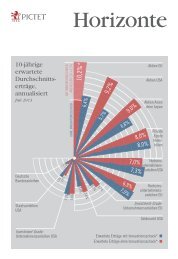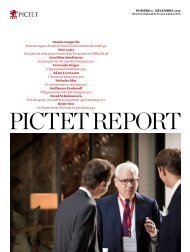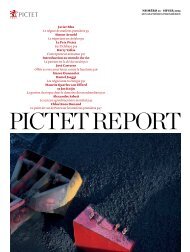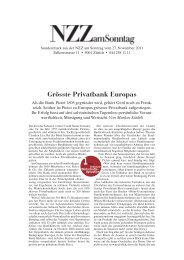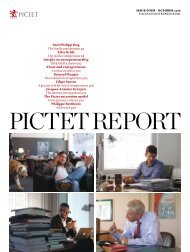Entrepreneur roundtable Services with a smile - Perspectives Pictet
Entrepreneur roundtable Services with a smile - Perspectives Pictet
Entrepreneur roundtable Services with a smile - Perspectives Pictet
You also want an ePaper? Increase the reach of your titles
YUMPU automatically turns print PDFs into web optimized ePapers that Google loves.
choices for individual customers in<br />
marketplaces <strong>with</strong> a multiplicity<br />
of products. James Daunt said this<br />
curating role was central to his bookselling<br />
business: “Some bookshops<br />
sold the best display places to the<br />
publishers, so the selection process<br />
effectively disappeared. In my own<br />
shops, I aimed to restore the art of<br />
curation—to draw people into the<br />
shops and thus to sell more books.”<br />
Avid Larizadeh said that her business<br />
was also highly curated. “There are<br />
objective criteria based on quality<br />
and certain standards, and subjective<br />
criteria such as the need to have an<br />
inspiring story behind a piece. But<br />
it’s not just my taste: we have a team<br />
of style-hunters who travel the world<br />
and some of them will select pieces<br />
that would not have been my choice.”<br />
Had social media changed the<br />
programmes produced by Theo<br />
Kyriakou’s Antenna media group,<br />
asked Tyler Brûlé? “Is it down to who<br />
is making the programmes, or is it<br />
the pull of the crowd through online<br />
messages and tweeting?”<br />
Social media were an unstoppable<br />
power, Mr Kyriakou said, and his<br />
group had invested in both Facebook<br />
and Twitter. “But the media business<br />
is still nothing more than content<br />
distribution—the best content <strong>with</strong><br />
the best brands through the best<br />
distribution network to reach the<br />
viewers. Our editors are always<br />
customer-oriented, of course: people<br />
change their habits and their media<br />
consumption, and you have to be there<br />
before the competitors.”<br />
Bottica also evolved its business<br />
model, said Avid Larizadeh, to reflect<br />
developments in online browsing<br />
behaviour. But it would not turn into<br />
what Tyler Brûlé described as “a grand<br />
souk” in London or Paris: “It wouldn’t<br />
make sense. Our business model is<br />
based on holding no inventory and<br />
we couldn’t be global if we did that.<br />
The whole point is that you can get<br />
something from the other end of the<br />
world <strong>with</strong>out going there.”<br />
2<br />
For James Daunt, the changing nature<br />
of the global marketplace in books<br />
posed an awkward problem. “You<br />
can get exactly the same product I’m<br />
selling from Amazon and prices are<br />
always driven down to the lowest<br />
common denominator. We don’t own<br />
the content, and Amazon is now trying<br />
to publish its own books to own the<br />
content. It will be interesting to see<br />
whether book retailers seek to follow<br />
suit—if they do, it will be back to the<br />
future: Victorian booksellers were also<br />
publishers.”<br />
When it came to questions from the<br />
audience, the entrepreneurs were<br />
asked what they would define as great<br />
service. Kit Kemp’s answer was that<br />
it is all about people wanting to come<br />
back. “When people travel, they are<br />
often tired and people take 24 hours to<br />
get to know the hotel. It’s a matter of<br />
taking something they are not used to<br />
and turning it around so they enjoy it<br />
and become a friend who believes in<br />
the place.”<br />
Tyler Brûlé asked her about the<br />
honesty bars in Firmdale hotels— fully<br />
stocked bars in a public space <strong>with</strong> a<br />
<strong>Entrepreneur</strong> <strong>roundtable</strong>: <strong>Services</strong> <strong>with</strong> a <strong>smile</strong> | Winter 2012<br />
notebook for people to record what<br />
they had taken. “The reasoning,” Kit<br />
Kemp said, “was that if you’ve been<br />
to the theatre or are going somewhere<br />
and you want a drink, you can serve<br />
yourself, as if you were entertaining<br />
at home. Some people make a great<br />
show of signing the book, but you’re<br />
also going to find those who have half<br />
a bottle of vodka in their pocket—and<br />
I think that’s quite funny!”<br />
“The media business is still nothing<br />
more than content distribution—the<br />
best content <strong>with</strong> the best brands<br />
through the best distribution network<br />
to reach the viewers.”<br />
Theo Kyriakou, CEO of Antenna<br />
“If you’ve got all those, everything else<br />
can still go wrong and you’re OK.”<br />
Theo Kyriakou said that in free-toair<br />
television, his clients were the<br />
advertisers. “We must attract the<br />
audience, the eyeballs, and deliver the<br />
demographics advertisers need at the<br />
right time. As television becomes more<br />
competitive <strong>with</strong> more stations, you<br />
need to be closer to the client and to<br />
deliver every single day.”



